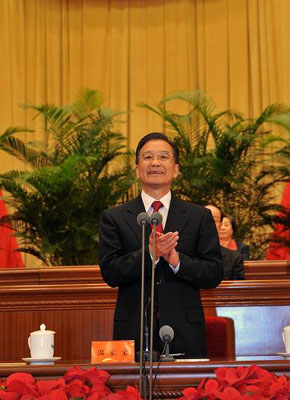He noted that the practice of launching manned space flight proved scientific development is a necessity for achieving the goals set for the country's development. It also showed the political advantage of a socialist system which was able to produce great national cohesion.
|

|
|
Premier Wen Jiabao presides over the meeting.
|
Innovation is the key to the nation's development, and patriotism is the inspiration for achieving all the great causes, Hu added.
"We always have to take reform and innovation as the greatest inspiration and continuously stimulate the creativity and vitality of the whole society," Hu said. "We should regard improving the ability of innovation as a strategic task and strengthen the national scientific and technological capacity."
He added that the country should make it a basic principle to cultivate a team of talented people with innovative ideas.
He said that reform of scientific and technological systems should be deepened to promote the construction of a national innovative system.
Chang Wanquan, chief commander of the manned space project said the success of Shenzhou VII's space flight showed the great strength of national cohesion and boosted the confidence of people working for space missions to make new achievements.
Chang said that more than 110 research institutes were involved in the mission. More than 3,000 organizations nationwide were offering coordination and help.
Zhai Zhigang, speaking on behalf of the Shenzhou VII space flight team, said completing the mission successfully was his lifelong dream and biggest honor.
He said he took a small step in space but a big step for the Chinese nation.
Shang Zhi, general director of the mission's spacecraft system, said Chinese scientists and researchers are ready to begin the next phase of space missions, which focus on rendezvousing and docking spacecraft in orbit. Zhi also wants to manufacture a space laboratory.